When your company is first starting out, email is usually enough to handle your customer requests. But as your company grows, you need a better way to handle those requests coming in before your support team becomes overwhelmed.
That's where a help desk ticketing system can help. It will monitor all of the customer requests that come in, give them a unique ticket number for both you and your customer to track, and help you organize those requests so that you can reach the most important ones first.
If your team is ready to upgrade from email, this guide will help you pick the best free help desk ticketing system.
What is a help desk ticketing system?
A help desk ticketing system is software that organizes customer questions. When someone reaches out — by email, phone, chat, or another system — the system makes a record. This record, or ticket, helps teams track each request until it's solved.
But help desk ticketing systems do more than just track tickets. They often include tools to build answer libraries, set up self-service options, and boost team output. Many also work with other software your team uses, making the whole process smoother.
The benefits of using a help desk ticketing system
While more commonly associated with customer service and IT, a help desk ticketing system can benefit many teams across just about any industry. For instance, departments like human resources (HR) and maintenance also field a large number of requests, and a ticketing system can keep those messages from getting lost in the shuffle.
No matter the use case, the benefits of a help desk ticketing system include:
Better collaboration and transparency: Help desks ensure that everyone on the team knows the status of every issue, and they provide tools that help agents work together without stepping on each other’s toes.
Increased organization and efficiency: Ticketing tools include tagging, categorization, and analytics features that enable you to track performance metrics and trending issues. They also include productivity and automation tools to help teams streamline their operations.
Improved customer experience: Help desk software allows you to provide a better user experience by giving users more agency over how they receive support. Whether it's through self-service options or additional channels like social media, help desks increase customers' access to help.
It benefits everyone when your agents can work together to solve problems without friction, issues are easily tracked and moved through the resolution process without getting lost, and users can find answers on their own terms.
Features to look for in a help desk ticketing system
When shopping for a help desk ticketing system, there are several key features you should look for:
Omnichannel ticketing: If you get customer questions from many different sources, look for a help desk that supports multiple communication channels. That may include email, chat, phone, social media, messaging, and video conferencing, among others.
Collaboration tools: Look for features like internal notes, ticket assignments, reply templates, and the ability to tag colleagues in on a case. These features make it easier to work through the queue as a team.
Self-service options: If you want to help your customers find their own answers, look for ticketing systems with self-service options like knowledge base builders, community forums, and customer portals.
Automation and AI: In addition to basic automations like ticket routing, you may want to look for a ticketing system with AI features like a chatbot or writing assistants. These features help free up your staff to handle those issues that require human expertise.
Reporting: To understand and improve how your team is performing, look for systems that provide reports on the most important metrics for your team (e.g., resolution times, SLAs, customer satisfaction, and agent performance).
Integrations: If you need to pull data from other systems into your help desk to provide better support, look for a ticketing system that can integrate with other tools in your team’s tech stack, such as bug-tracking software, CRM platforms, or ecommerce tools.
Specialized features: Finally, you may want to choose a system that offers features that are specific to your industry or use case. For example, a system focused on the IT services use case may include features for tracking devices like computers or other company-owned equipment.
The 9 best free help desk ticketing systems
There are plenty of ticketing solutions on the market. However, depending on your use case and the type of service you provide, each will have pros and cons. We’ve put together a list of nine of the best free help desk ticketing systems below, along with suggestions on what types of teams might benefit most from each platform.
1. Help Scout – Best for customer support teams
Help Scout is an easy-to-use help desk platform that's built for customer support teams. With it, you can create a shared inbox for managing email requests and publish a help center for self-service support. You also get access to powerful collaboration and organization tools to improve your team's productivity.
Inbox
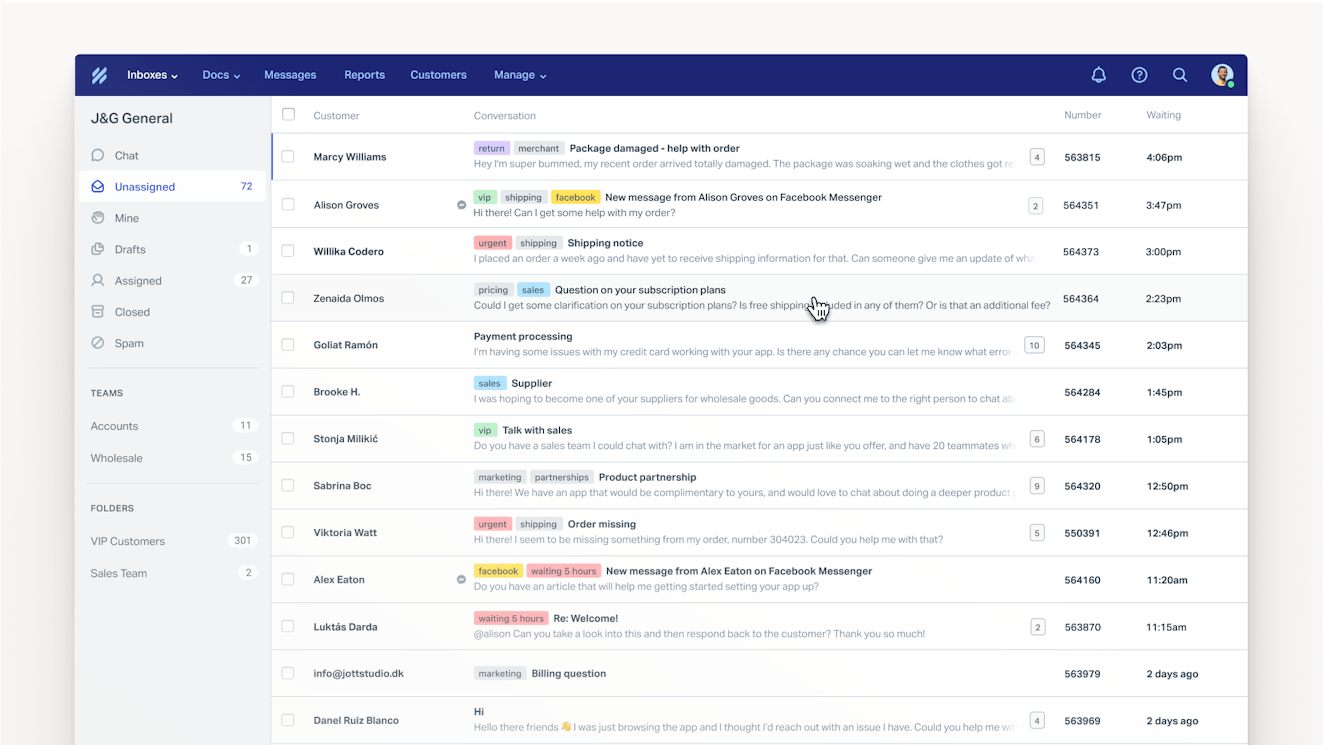
All email requests you receive are funneled into Help Scout's shared inbox. Each conversation displays a customer profile in the sidebar that shows the customer's name, location, previous conversations, and information pulled from third-party sources. This provides you with the information you need to deliver contextual, personalized support.
You also get access to helpful collaboration features like conversation assignments, collision detection to ensure customers never receive duplicate responses, and internal notes and @mentions for documenting case updates or asking teammates for help. You can also create 10 saved replies — short text snippets for standardized responses — to answer FAQs quickly.
Docs

Many customers prefer to help themselves, and with Help Scout’s knowledge base tool, Docs, your customers can do just that. Create a help center with answers to FAQs, how-tos, and videos help customers help themselves and decrease the number of support requests you get.
Reporting
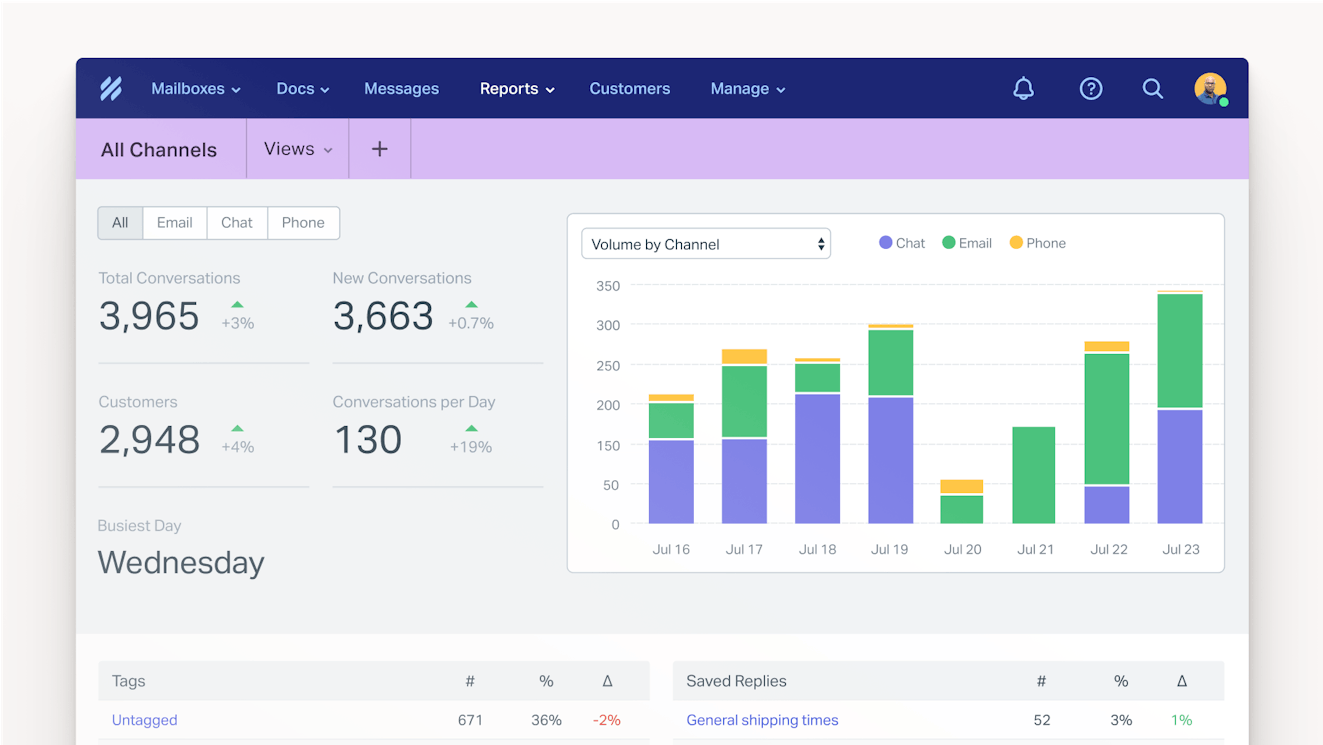
Back up your decisions with data using Help Scout’s reports. You can track metrics like conversation or channel volume, employee performance, or even the success of your Docs site so you can decide which articles are the most helpful and identify areas for improvement.
What's included in the free plan?
Help Scout's free plan includes five users, one shared inbox, one Docs site with up to 10 articles, ticket assignments and auto-replies, snooze and send later, 10 saved replies, 10 tags, one contact form, and reports with up to one month of data.
Learn more about Help Scout:
2. Google Collaborative Inbox – Best starter ticketing system
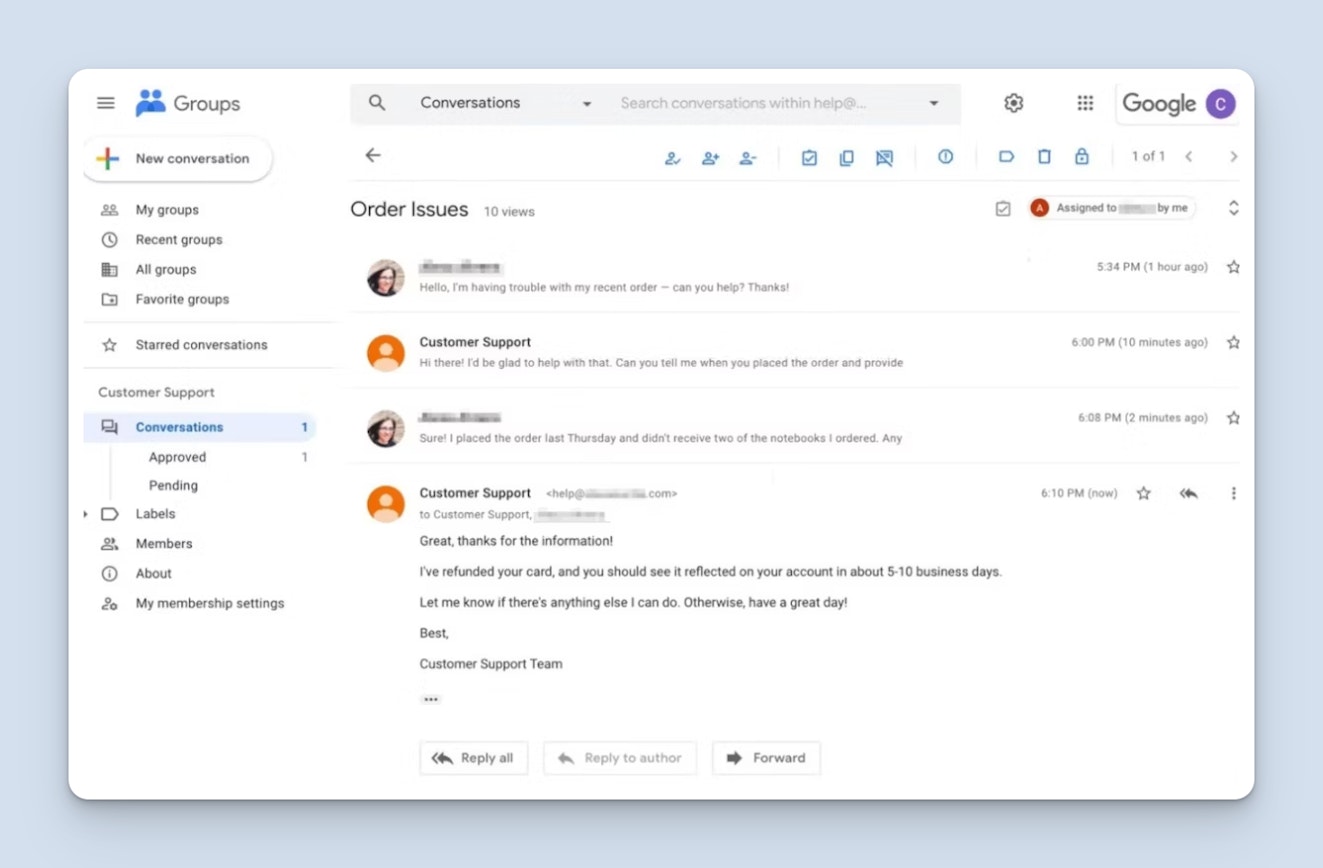
If you’re already using Gmail and want to add some structure to your support efforts, Google Collaborative Inbox can be a good, free starter ticketing system.
The best way to think about Collaborative Inbox is as a shared folder multiple people can access from their own personal email accounts. With it, you’re able to assign conversations to individual group members and add statuses to requests. Group members can do things like mark an issue as a duplicate or as resolved. You can also set permissions for different people or teams who have access to the Collaborative Inbox.
Setting up Collaborative Inbox is relatively simple. You set up the email address, create a Google Group, and then add people to that group. That’s it. Now everyone in the group can respond to emails in the group mailbox without sharing login information.
Google Collaborative Inbox is very basic in functionality, but the thing that really makes it different — assuming you already use Google Workspace — is that you don’t have to sign up for additional software, making it very convenient to get started. It also allows up to 25 members, which is higher than many other free help desk ticketing systems.
What's included in the free plan?
Google Collaborative Inbox is 100% free for Google Workspace subscribers and includes one shared inbox, ticket assignments, ticket statuses, and agent permissions for up to 25 users.
3. Jira Service Management – Best for engineering teams
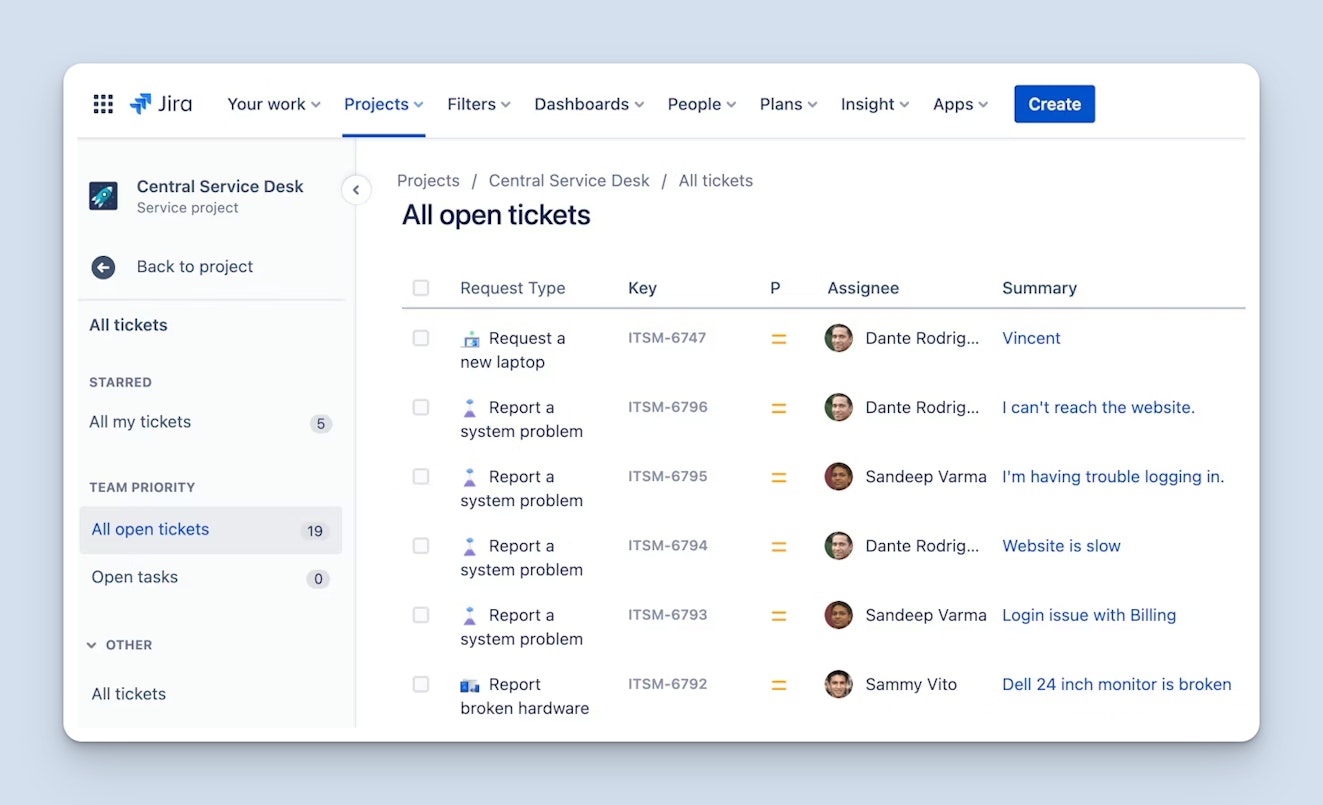
Most SaaS companies are familiar with Jira, Atlassian’s project management software. Beyond typical project management features like product roadmaps, Jira is often used by engineering teams to track development work and bug reports.
If you’re looking to branch into customer or IT support and Jira is part of your tech stack, Atlassian’s help desk, Jira Service Management, makes a lot of sense. It has all of your basic help desk features like ticket tracking, assignments, a knowledge base, and tools for incident, change, and asset management — all wrapped up in a familiar user interface (UI).
Service Management also allows for integrations with a wide range of apps, including messaging services like Microsoft Teams and Slack, or you can code your own custom add-ons using Jira's REST API.
Top features
Service desk for ticket management
Self-service portal w/knowledge base
Incident, change, and asset management tools
AI features
What's included in the free plan?
Jira Service Management's free plan can be used by up to three agents and includes email support, chat support, customer portals, intake forms, workflows, incident templates, and on-call schedules.
4. ProProfs – Best for customer feedback
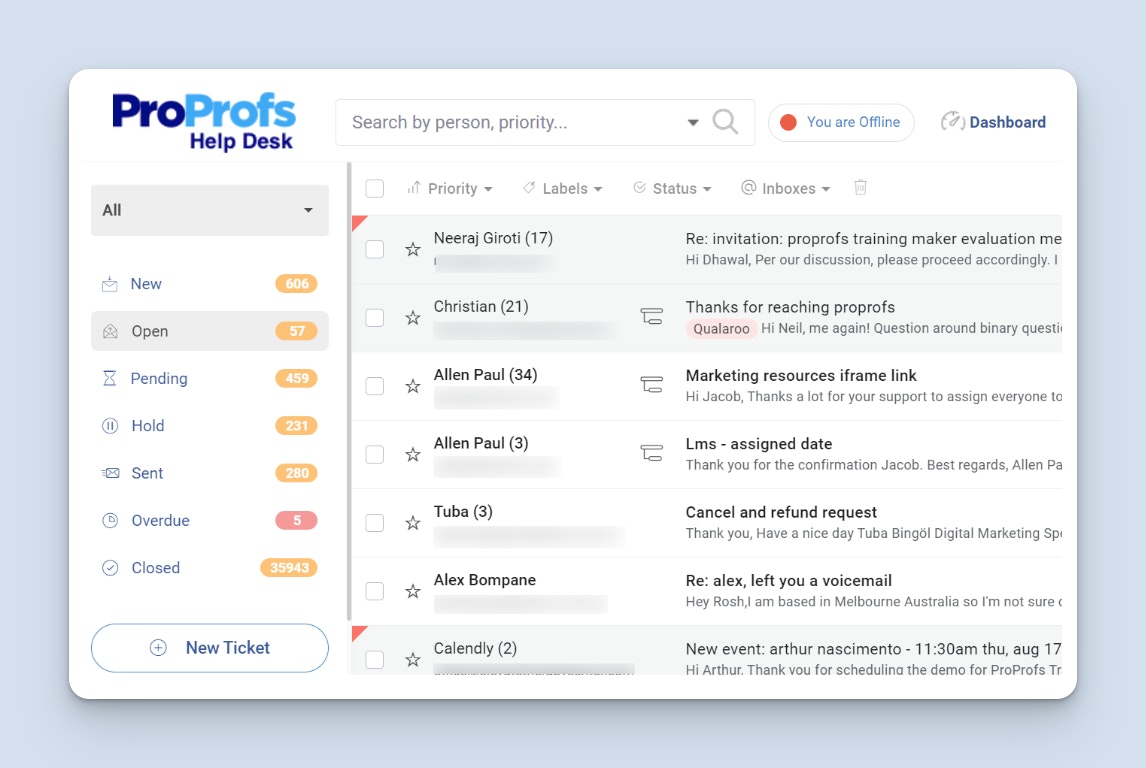
If you are a team of one, ProProfs’ solution can be appealing: Its free plan has everything you need to start supporting customers, like unlimited tickets, canned responses, auto-responders, labels, and even a mobile app for easy support via a portable device.
ProProfs’ help desk is great for both customer support and IT teams alike. Both teams can use the platform to offer multichannel support across email, live chat, and a help center. It also provides collaboration features like internal notes and automation capabilities for a streamlined workflow.
Top features
Unlimited ticketing w/multiple inboxes
Canned responses
Reporting
What's included in the free plan?
ProProfs' free plan works for a single user and includes unlimited tickets, canned responses, and multiple inboxes.
5. Spiceworks – Best for large IT support teams
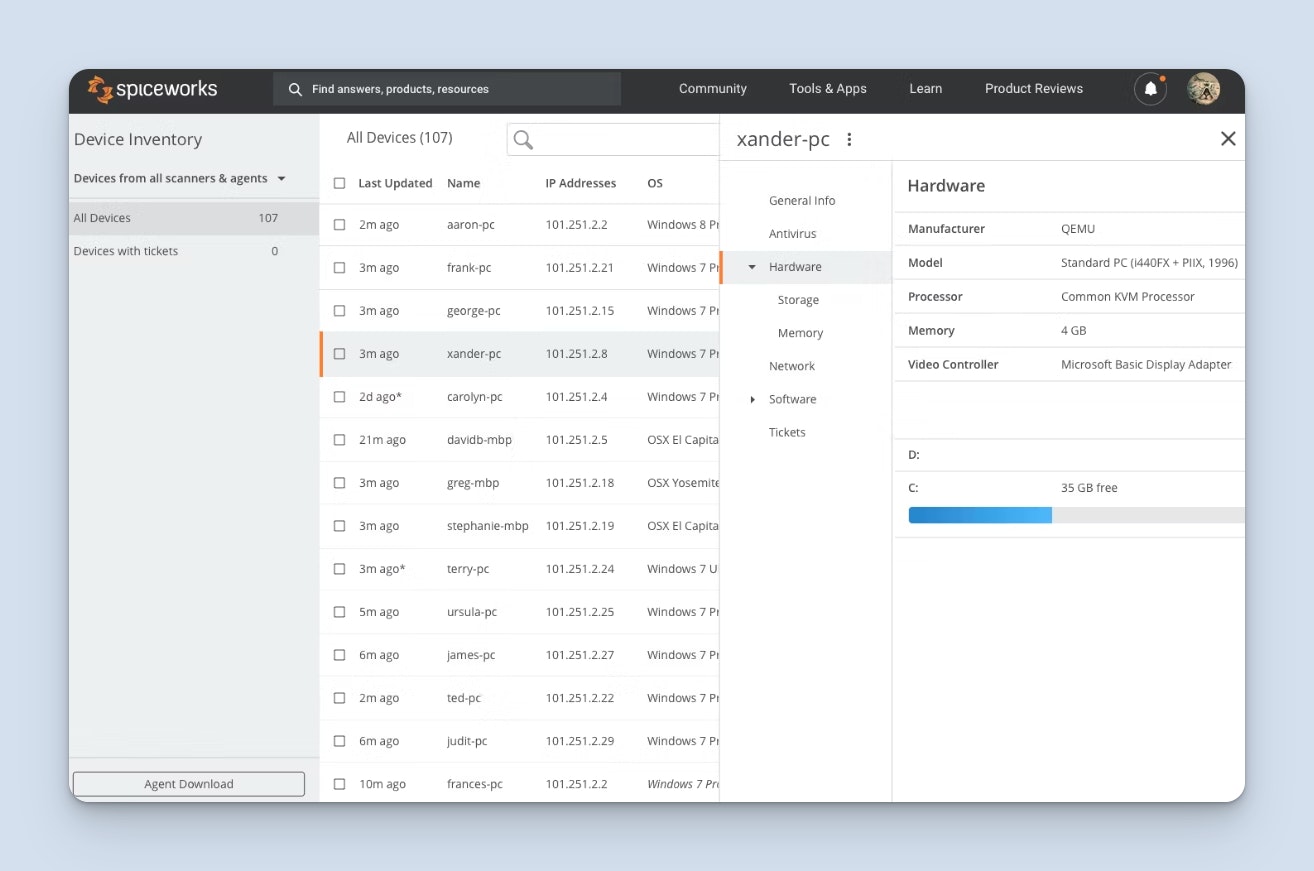
With Spiceworks, you can efficiently manage customer requests through a customizable web portal. You can automatically assign and route tickets based on predefined priorities and categories, helping requests get to the right person right away. Further, you’re able to create automated responses for routine questions to save agents time and improve productivity.
Something a bit unique about Spiceworks is that it has features for inventory management, making it ideal for an IT use case. Along with that, they also offer a customizable knowledge base, which is nice to offer as a self-serve support option.
Along with those features, they also have fairly robust analytics options. You can filter data and create custom reports. You can even connect to Power BI to get more sophisticated with your data. Spiceworks also offers a mobile app, so you can handle requests even when you’re away from your desk.
One thing to note is that Spiceworks can provide its tool for free because it generates revenue from in-app ads. However, if you aren’t bothered by the ads, it makes a lot of sense to save money and take advantage of an entirely free tool.
Top features
Cloud-based ticketing solution
Knowledge base
Reporting features
Mobile app
What's included in the free plan?
Spiceworks is 100% free to use and includes unlimited users, a shared inbox, iOS and Android apps, no conversation limits, automated responses, inventory management, and a help center.
6. Zoho Desk – Best for small businesses
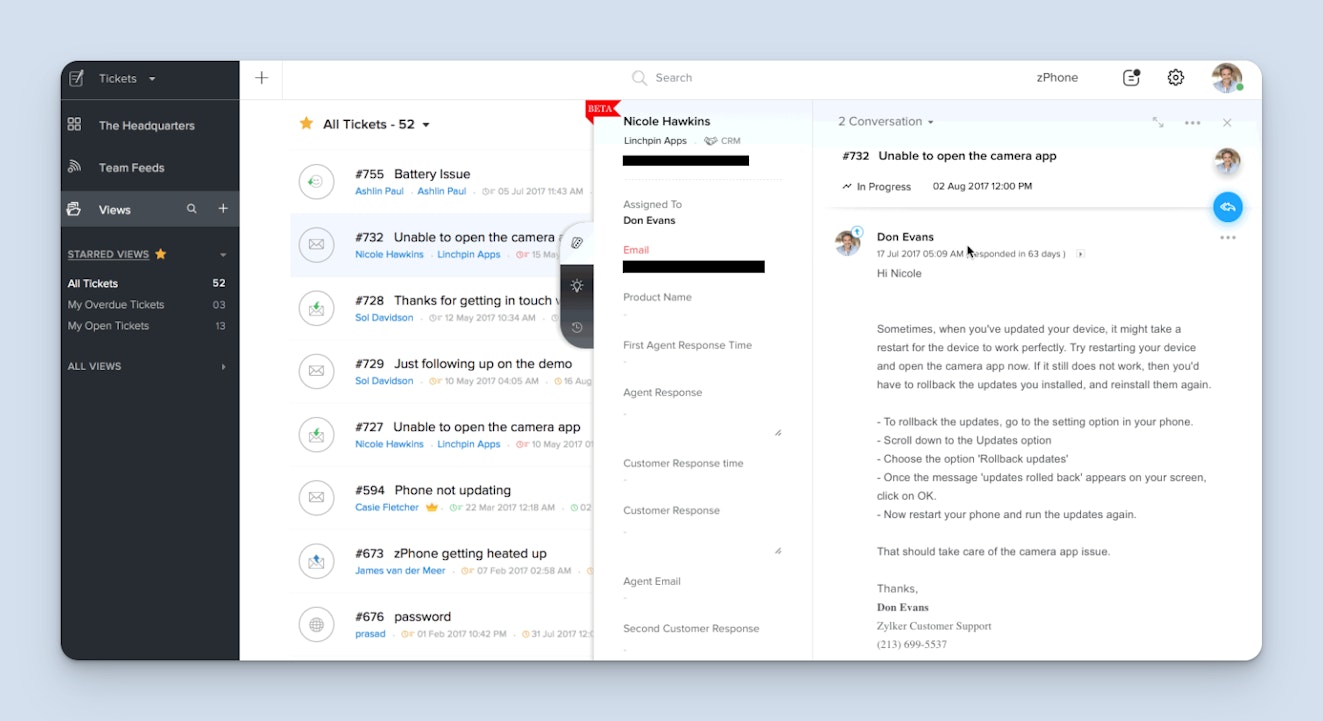
Zoho Desk is a great option for small businesses with a free plan for up to three seats and unlimited tickets. If you’re a high-volume, small team, it could be a good option. On the free plan, you get one shared inbox as well as one help center.
With the shared inbox you can create up to 10 tags to categorize tickets. You can also create two macros, which are canned responses that can help you answer common questions quickly.
Further, you can set up notification rules to let customers and agents know about changes or updates to a request. You can also add customers as contacts and save certain information about them so agents have more context in future interactions.
One feature that’s a bit unique from Zoho is the ability to create a feedback widget and add it to your site. It’s essentially a web form where visitors can leave feedback directly from the page they’re on. You can also create intake forms for support requests, which can be useful for getting certain information upfront, saving agents time when responding.
What's included in the free plan?
Zoho Desk's free plan includes three users, one shared inbox, one help center, two macros, notification rules, a feedback widget, and an intake form.
7. UVdesk – Best for ecommerce companies

UVdesk's free plan offers unlimited seats and a shared inbox for email requests. The platform as a whole is ecommerce-focused and allows users to add a website widget where visitors can submit requests directly. They do this through web extensions for Shopify, Magento 2, Opencart, Prestashop, and WordPress sites.
The free plan also offers some productivity features like saved replies. You can prioritize tickets as well as set a ticket status to keep customers up to date on progress. You’re also able to create custom email templates.
Along with email support, you can create a knowledge base with UVDesk. There’s no article limit, and you can organize articles into different categories to make navigation easier for visitors. Last, you can customize the look of the web widget with color selection or even by adding your own custom CSS.
What's included in the free plan?
UVdesk's free plan includes unlimited users, a knowledge base, saved replies, ticket statuses, and Shopify, Magento 2, Opencart, and Prestashop web extensions.
8. osTicket – Best open-source ticketing system

osTicket is a free, open-source help desk ticketing system that gives teams the ability to provide email support to customers. There’s no seat limit or request limit, and they have some useful productivity features like the ability to create custom columns and queues to keep requests organized.
There’s also a collision detection feature that allows agents to lock a ticket while they’re working on it to avoid another agent chiming in at the same time. This helps avoid duplicate work and stops customers from getting multiple responses, which can be very confusing. You can also set up ticket filters to route requests to different agents and departments based on rules you set in the platform.
One thing that’s fairly unique about osTicket is the tasks feature, which you can use to create different tasks related to specific issues. It’s a great way to create checkpoints and keep track of progress for more complex issues. You can also create a customer portal, giving people access to self-serve support options.
What's included in the free plan?
osTicket is 100% free and includes unlimited users, a self-service portal, collision detection, no conversation limits, custom queues and columns, and task management.
9. Hiver – Best for small companies with no dedicated support team
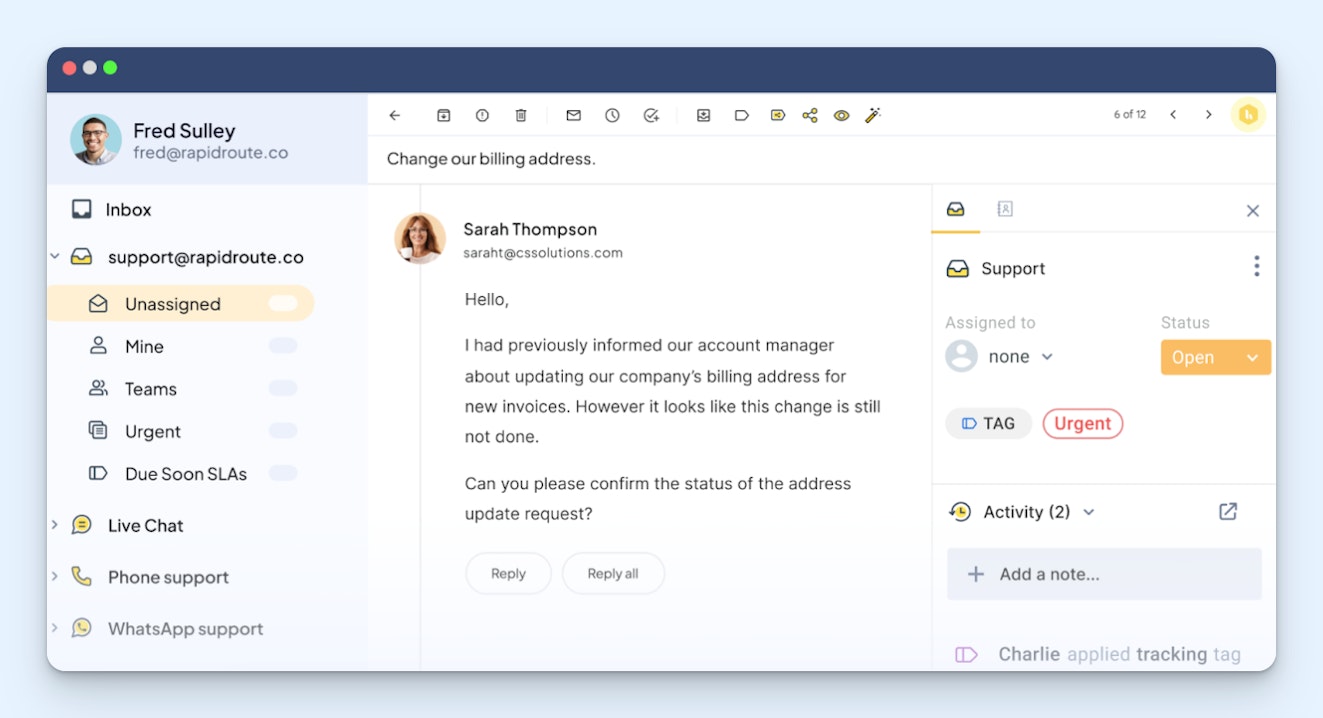
If your company doesn't have anyone whose sole job is supporting customers and you're looking for a free system that will allow you to add more than five team members from other departments to manage a low volume of support requests, Hiver might be the right solution.
While Hiver's free plan is fairly limited in terms of collaboration features (you can only create one tag and one email template, and you don't get collision detection), you can add unlimited users who can manage email together in a shared inbox. You can also offer live chat support, build an external knowledge base with up to 50 articles, and offer support over WhatsApp.
Additionally, you do get access to some of Hiver's collaboration features on the free plan. Share draft replies with other team members to get their feedback before hitting send, see recent conversations that other members of your team have had with customers, and set office hours so you can easily see who's available to reply to incoming requests.
If you're looking for something simple that will allow several people in your company to manage customer support until volumes are so high that you need to hire a dedicated support team member, it's a good choice.
What's included in the free plan?
Hiver's free plan includes unlimited users, one shared inbox, one tag, one email template, an external knowledge base with up to 50 articles, and the ability to deliver live chat and WhatsApp support.
Choosing the best help desk ticketing system for your team
There’s no such thing as a “best” system. There is only what is best for your business right now.
Take a moment to consider what problems your team is trying to solve with a help desk ticketing system, what features you need to achieve your desired outcome, and which of the tools above is the best fit for getting you there. Here are some questions to answer to find the right option:
Who is the primary audience you’re serving? Some tools are built for IT support, and some are built for customer support. Knowing who you’ll provide support to and how you’ll provide it can help guide you toward the most ideal option.
How well does the tool scale? This is a big factor to consider. Chances are you might want to upgrade your plan eventually, so pay attention to tools that make leveling up easy to do.
What’s it like to use? Even free tools don’t get used if they’re a pain. Make sure you’re kicking the tires and trying things out. Having something that’s comfortable and intuitive will ensure you get the most value possible out of your selection.
The questions above should help get you started in making a selection. That said, if you want more guidance on selecting a help desk, we have a whole guide on the topic.
Finally, once you've put together a shortlist, consult with colleagues, check out reviews on sites like G2 and Capterra, and consider taking advantage of free trials to really get a feel for whether or not the platforms you like are going to work for your team.








